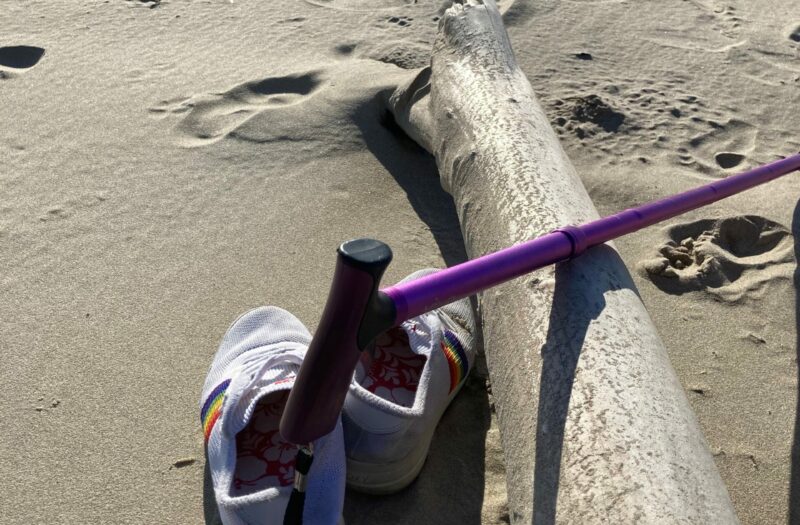It’s June, and for me that means breaking out all of my rainbow clothes and layering on the glitter makeup, because it is Pride! As a queer femme, June is a month where not only can I just be myself, but I can also celebrate that identity with others.
When I came out about nine years ago, one of the things I immediately noticed was the amazing community I suddenly became a part of. There was a solidarity amongst the queer community I’d never experienced before. This solidarity comes in part from having something in common, but even more so, it comes from a shared struggle. While queerness is far more accepted now than it has been in the past, we are still very discriminated against. In fact, according to the Human Rights Council, in 2022 alone 28 states have introduced anti-LGBTQIA+ legislation, with things such as the “don’t say gay” bill and anti-trans laws.
In her poem “Pride,” Joanna Hoffman writes: “So when my friend asks me why there are no straight pride parades / I tell her / You can’t be proud of something you never have to fight for.” Pride started as a riot in 1969, with members of the queer community literally fighting for their right to exist in public without being harassed by police. For myself and my queer community then, Pride is a chance to celebrate who we are despite people and laws that try to silence or erase us.
More Than One Kind of Pride
While June’s Pride Month, with its parades and parties, may be the most well-known for people, there is another Pride in July as well — Disability Pride. In July of 1990, President Bush signed the Americans with Disabilities Act, and many cities and states began recognizing July as a month to celebrate Disability Pride.
Much like Pride for the LGBTQIA+ community, Disability Pride is a chance for the disability community to celebrate our identities and fight for our rights. According to AmeriDisability, “This annual observance is used to promote visibility and mainstream awareness of the positive pride felt by people with disabilities.”
While the Americans with Disabilities Act did a lot to secure the rights of disabled individuals, in our daily lives we are still often discriminated against, infantilized, or seen as lesser citizens. Disability Pride Month gives our community the chance to share our voices and be more visible in a society that often doesn’t see us.
Celebrating My Disability
For some it may seem like a strange thing to be proud of or celebrate a disability. However, as I see it, there are many things to celebrate about my experience as a disabled woman.
- My disability has helped me to prioritize my life and recognize the things that are most important to me. It has forced me to slow down and be more present in my life, something I was not very good at doing prior to becoming chronically ill.
- My disability has given me a creative mind and outlook on life. When I’m faced with things that may be difficult to do because of my physical limitations, I improvise and come up with new and unique ways to accommodate myself in a society that caters to non-disabled individuals.
- My disability has made me a more compassionate and empathetic person, a better friend and partner, and a more understanding mom. Because I navigate the world with abilities that are different from others, I find I’m more empathetic toward others as they too struggle. I can relate to people who are going through hard times, and because of the slower pace of my life, I also find myself in the position to spend more time with friends who are struggling.
Celebrating Community
My disability has also given me an incredible community of other chronically ill, neurodivergent, and disabled individuals. Just like the community I gained when I came out as queer in 2013, I gained another community when I became disabled in 2014. This is a group of people who have similar life experiences as me, and who also face in their lives the struggles and ableism inherent in living as a disabled person in a world that prioritizes non-disabled individuals.
My disability community has provided me with information as I navigate new medications or scary symptoms. They have commiserated with me when I need to rant about another random stranger asking to pray for me when they see my cane, or another doctor telling me my symptoms are just in my head. They have provided resources, given ideas, and have just been there as a support when times get hard. There is something special about having others who can relate to and understand the things one goes through daily. It makes living with a disability feel less lonely and isolating.
While my disability has limited my physical ability to do some things, it has also opened my world up in many ways, and I absolutely will celebrate that. So as June comes to a close, I may be putting away my rainbow romper and unicorn headband, but I’ll be unapologetically stepping out with my cane and posting about my disability on social media. I’ll continue with my feelings of pride, celebrating all the aspects of my identity that make me who I am, acknowledging the struggles me and my community have overcome, and using my voice to continue to demand a world where we are all not only accepted, but celebrated.
Want to Get More Involved with Patient Advocacy?
The 50-State Network is the grassroots advocacy arm of CreakyJoints and the Global Healthy Living Foundation, comprised of patients with chronic illness who are trained as health care activists to proactively connect with local, state, and federal health policy stakeholders to share their perspective and influence change. If you want to effect change and make health care more affordable and accessible to patients with chronic illness, learn more here.






